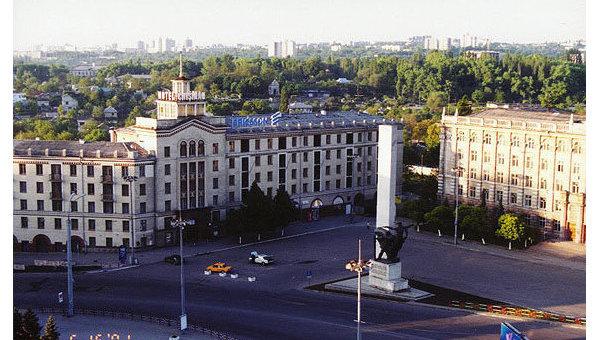The Republic of Moldova
 The Republic of Moldova is situated in south-eastern Europe, between Romania and Ukraine. Has access to the Danube Delta, length 0.4 km, where is equipped the port Giurgiulesti).
The Republic of Moldova is situated in south-eastern Europe, between Romania and Ukraine. Has access to the Danube Delta, length 0.4 km, where is equipped the port Giurgiulesti).
Capital - Chisinau (population about 0.8 million people).
Official language is Moldovan.
Area - 33.8 thousand square kilometers and it is administratively divided into five municipalities, 32 districts, autonomous territorial unit of Gagauzia and Transnistria, which is de facto independent but internationally unrecognized entity.
President of the Republic of Moldova is the head of state, who represents the state and is the guarantor of national sovereignty, independence, unity and territorial integrity of the country. In this context, the term "head of state" means the person called to represent the state at the highest level, and who personify the entire nation and its territory (Article 77 of the Constitution).
Marian Lupu is the acting Moldovan President since December 30, 2010.
Moldova is a parliamentary republic. The President and Vice President are elected after the legal formation of Parliament. According to the Regulations of the Parliament, President is elected for a term of office of the Parliament by secret ballot by a majority of votes of the elected deputies, by the request of the parliamentary factions. Vice-Presidents are elected by open ballot by a majority of votes of the elected members of Parliament of the proposal of the President, after the consultation with the parliamentary factions.
Population (without Transnistria) is 3.56 million people, according to February 2011 data. Ethnic composition (without Transnistria): Moldovans - 76%, Ukrainians - 8.4%, Russians - 5.9%, also live Gagauz (4.4%), Romanians (2.2%), Bulgarians (1.9% ) and others, all in all, about 120 nationalities.
Transnistrian population is 0.52 million people. Dominated by Russians (32%) and Ukrainians (32%), the part of Moldovans is 26%. The part of the urban population is 75%.
National holiday is the Independence Day, which is celebrated on August 27.
The highest executive body is the Government. On January 14, 2011 the new government, led by the leader of the Liberal Democratic Party V. Filat, won a confidence vote of Parliament (supported only by members of the ruling coalition). The composition of the governing Alliance "for European integration" includes Deputy Prime Minister and Minister of Foreign Affairs and European Integration Yu. Lyanke (Liberal Democratic Party), Deputy Prime Minister and Minister of Economy V. Lazer, Deputy Prime Minister for Social Affairs M. Moldovan, Deputy Prime Minister for the Transnistrian settlement Ye. Karpov (independent), 14 specialized ministers, the head of the Academy of Sciences of Moldova G. Duka, the head of the Autonomous Territorial Unit of Gagauzia M. Formuzal.
Economy. Moldova is the agro-industrial country. The most developed viticulture, vegetable-and fruit-growing. There are enterprises of electrical engineering, metallurgy, light, food and other industries (mainly concentrated in Transnistria).
Under the influence of the global financial and economic crisis, Moldova's GDP in 2009 reduced by 8%, and made up $5 billion dollars. Inflation - 0.4% (compared to 7% in 2008). Due to the severe budgetary deficits, new government in October 2009 began the negotiations with the IMF and other international institutions to get their bailout grant-in-aid. In January 2010, was signed a memorandum of financial assistance in the amount of $574 million dollars. On the March meeting of Western donor countries in Brussels, announced the intention to mobilize financial investments in the Moldovan economy in the medium term in excess of $2 billion dollars.
By results of 2010, the GDP of the Republic of Moldova (without Transnistria) rose by 6.9%, and reached approximately $6 billion dollars with inflation of 8.1%. Meanwhile, the recovery of GDP growth is accompanied by an imbalance in foreign trade (foreign trade turnover - 5.5 billion dollars, including exports - 1.6 billion dollars; import - $ 3.9 billion dollars, the deficit - 2.3 billion dollars), by decrease in investment savings, the breakdown of the privatization campaign (it was able to realize the state property in the amount of $8.3 million dollars instead of the planned 35 million dollars). At this background is recorded the growth of external debt: total external debt is about 70% of GDP, including the government borrowing - 25%. Foreign exchange reserves - about $2 billion dollars. There are no major changes in the social life: in the third quarter of 2010, unemployment grew by 5.7%, wages remained at the same level (about 316 USA dollars), by 3.3% (up to 67.5 dollars) decreased pensions, living wage was about $108 with an average expenditure per person per month - $118.9.
External relations. Moldova is a member of the UNO, OSCE, Council of Europe, GUAM, it remains as the member of CIS and is an observer of the EurAsEC, "focus country" of Eastern Partnership. The highest priority in the government program is designated the integration of euro. There is a confirmed course for development of a "strategic partnership" with Russia, the USA and neighboring countries - Ukraine and Romania.
























